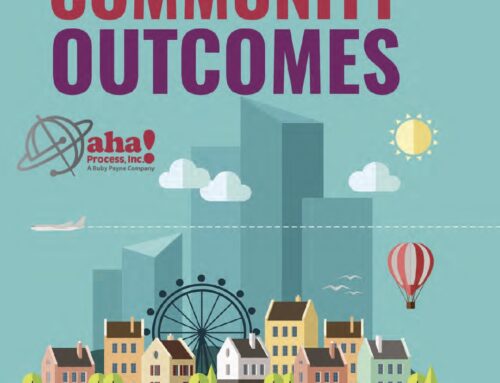 Alcoholics simplify the Alcoholics Anonymous program into the following minute-by-minute instructions for life: “Keep doing the next right thing.” Even when overwhelmed, unmotivated, or weary, alcoholics in recovery rebuild lives worth living by taking life one moment at a time, doing “the next right thing,” and watching momentum build.
Alcoholics simplify the Alcoholics Anonymous program into the following minute-by-minute instructions for life: “Keep doing the next right thing.” Even when overwhelmed, unmotivated, or weary, alcoholics in recovery rebuild lives worth living by taking life one moment at a time, doing “the next right thing,” and watching momentum build.
Ruby Payne’s work regarding overcoming poverty boils down to: “It’s all about relationships.” When people are overwhelmed, unmotivated, or weary in the battle to address the impacts of poverty, community is built one relationship at a time. Momentum builds. Relationships are as powerful as righteousness.
As a busy, single mother to three boys, I always wanted a Chevy Suburban. I had always strapped my children and their junk into a foreign, midsized sedan that was fuel efficient, but I finally got a taste of that sweet Suburban life in 2018 when we purchased an old, high mileage Suburban for $1,500. It was a disposable Suburban with heated seats. It was neither dependable nor attractive, but it was just like I dreamed: It held sporting equipment and had enough seating for each son to invite a friend. I savored the space for a year, driving it locally until the engine blew. As is commonly the case in Povertyville, where I live, I could not afford to replace the engine. The Suburban sat parked beside my house awaiting title production from a divorce proceeding.
For the first time in a long time, Texas saw subzero temperatures followed by a statewide scramble to repair damage to the utility delivery infrastructure. My elderly parents live in our family farmhouse, which outdates the couple in their 80s by several generations. Of course, their pipes burst, and every Texan with skill and a wrench was busy making repairs. Outside Povertyville, I would have called every plumber in town and gotten on a waiting list for service. Plumbing repairs are unpredictable in price, and while I certainly am responsible for my parents’ well-being, I do not have the disposable income to shoulder what could be a hefty price tag for repairs. There is no comparison shopping in a market where demand is starkly greater than supply.
A man doing repairs to a neighbor’s plumbing asked if I would part with the seats out of the Chevy that sat beside my home like an albatross around my neck. I negotiated a trade of the entire Chevy (saving me the expense of having it towed) for repairs to my parents’ plumbing (win/win).
From my address in Povertyville, I have developed a very informed position regarding bartering. Here bartering is common because money is not. I previously believed that bartering was predominantly limited to people in poverty and the working class because the wealthy class prefers to pay for items rather than discuss costs as though they are limited in funds. I’ve come to the opinion that bartering in the form of trading takes place in every socioeconomic class according to their unspoken rules. Tit-for-tat is a successful strategy everywhere it is applied.
In poverty, negotiations teeter-totter between costs and how much is in the bank. If the purchase is a need and the funds are not available, bartering is the next natural step. Among the affluent, negotiations certainly take place, but never under the supposition that funds may not be available. Among the affluent, bartering morphs tit-for-tat into trading favors, the predecessor of “it’s not what you know, but who you know.” In middle class, I negotiated by finding flaws with the purchase in order to reduce the price based on value.
Had I operated under the unspoken rules of wealth, I would have called my plumber, paid overtime, and paid to have the Suburban towed to the junk yard (lose/lose). If I bartered according to the unspoken rules of the middle class, I would have carefully reviewed the value of the Suburban seats, the cost of the plumbing parts, the quality of the repairs, and negotiated based on the value of each, attempting to inflate the Suburban seats’ value and minimize the plumbing cost.
In poverty, I am so grateful for my God-sent plumber that in exchange for repairing my parents’ plumbing on a Saturday, I chose to negotiate his compensation without using the tit-for-tat strategy. The plumber attempted to make the seats an even trade for his labor, but in poverty, that is not how we function. I insisted he take the whole Suburban, $100, and offered him lunch. You never know when you may need a plumber, and it’s all about relationships. Yet again, Ruby is right.








